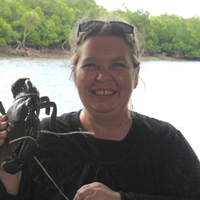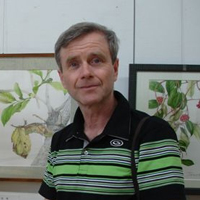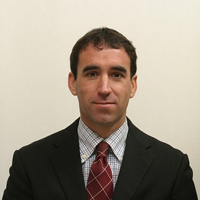[ LLL SIG Website ][ LLL SIG Publications ][ This Issue's Contents ]
![]()
Volume 4, Issue 3 [December, 2008]
Members-at-Large
Making a Large Contribution to LLL SIG
The LLL SIG currently has four members-at-large (MALs). These are members who play an active role in our group by assisting with or attending conferences and meetings; making presentations on our behalf; contributing to the newsletter; and offering us information, ideas and advice. This section of the newsletter gives voice to our MALs whose behind-the-scenes work for LLL SIG is much appreciated!
Curtis Kelly

The LLL SIG has been around for only a few years, but, since its founding, I have been surprised at how much further adult education has moved into our consciousness. Five years ago, it seemed as though hardly anyone talked about teaching English to adults, but nowadays you are hearing about it more and more. I have even heard from editors at three major publishers that they are finally interested in producing a textbook written specifically for older learners. And soon, we will get a whole issue of The Language Teacher dedicated to the topic. Yahoo!
I am proud of the members of the LLL SIG who have led the way in making others aware of this fascinating area of language education. They have taken the first steps in guiding others in what I believe will eventually be known as gJapanfs Adult Education Boom.h Letfs all continue our efforts; there is still much to be done. As increasing numbers of older learners return to school, we will have to work even harder to help teachers understand that adult learners may welcome variety in instructional delivery techniques. I urge those of you who have experience in this area to lend your help and support to new members. If you are already teaching older learners, then you have taken a first step to becoming a potential expert in this narrow area of language education, and many people out there are desperate for that very expertise. Share with them your stories, your methods, your dreams, and your wisdom.
Kim Bradford-Watts

The LLL SIG is a dynamic research and practice-based special interest group. Although other commitments prevented my full participation in LLL SIG events at the JALT 2008 National Conference, I luckily was able to attend the question-and-answer section following Neela Griffithfs feature presentation, as well as the LLL SIG Annual General Meeting (AGM). I rediscovered that, although small by JALT standards, the LLL SIG is nevertheless growing by leaps and bounds.
As I listened to the officer reports at the AGM, I came to realize the extent of the LLL SIG activities. During 2008, the LLL SIG co-sponsored conferences; contributed financially to bringing Asian students to PAC7 at JALT2008 National Conference; co-sponsored, along with the GALE SIG, Ms. Neela Griffiths at the JALT2008 National Conference; and produced three newsletters. Furthermore, members seem to be actively conducting research in the under-researched, broad field of lifelong language learning.
In 2009, LLL SIG members will continue their activities that promote knowledge of and interest in the field of lifelong language learning. Learner interviews conducted in English by Eric Skier and translated into Japanese by Masahiko Goshi will soon become available to researchers as an invaluable resource. The LLL SIG will again participate in the Pan-SIG conference and JALT2009. Most exciting for me, however, is the news that the LLL SIG will be publishing a special Lifelong Language issue of The Language Teacher.
All these activities will help raise awareness of the LLL SIG and its varied purposes. Each activity offers members the opportunity to help organize, present, or report on their research or classroom practices. Because the LLL SIG is concerned with lifelong language learning, it reaches across a broad range of learning contexts, including Eikaiwa (English conversation) classes for individuals who may have finished their formal schooling; business classes; language assessments designed for mature learners; and individual or directed study. I hope that members (and those who may not yet be members) will embrace the opportunity to share their classroom techniques, resources, and research to make presentations at conferences and to contribute to the upcoming special issue of The Language Teacher.
We are slowly building a valuable resource for researchers and practitioners involved in lifelong language learning in Japan. As we head into 2009, I am looking forward to the coming years of involvement in the LLL SIG.
Martin Pauly

My institution is a college for the visually impaired and, in some classes, we have students in their forties and fifties who have had to make career changes as their vision weakens. Dealing with different generations in one class is sometimes a challenge. I joined the LLL SIG to get ideas from others who are working with older people. In return and in appreciation, I am happy to contribute what I can. My main contributions to the LLL SIG include participating in a teaching contest at the JALT2005 National Conference and joining the LLL SIG Forum at the JALT2006 National Conference with a presentation on sign language.
Geoff Sinha

Hello, members of the LLL SIG.! I come from New Zealand, but Ifve been in Japan for eight years. For the past six years, I have been teaching older Japanese learners. I recently completed my M.A. in TES/FL. My masterfs thesis addressed the language attitudes that older Japanese learners might have toward English as a whole and toward the North American, Singaporean, and Japanese varieties of English. My research enabled me to meet some great people, such as Tadashi Ishida and Eric Skier, both of whom are dedicated and enthusiastic teachers of older Japanese learners. At the moment, I am a member-at-large, but I hope to become an officer someday.